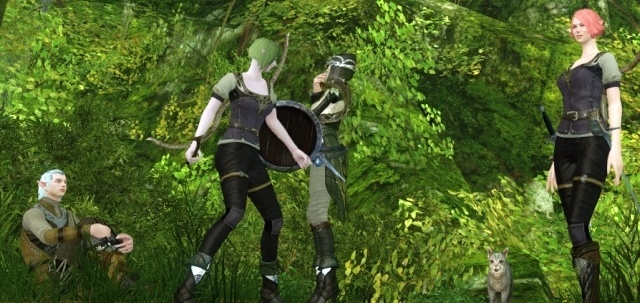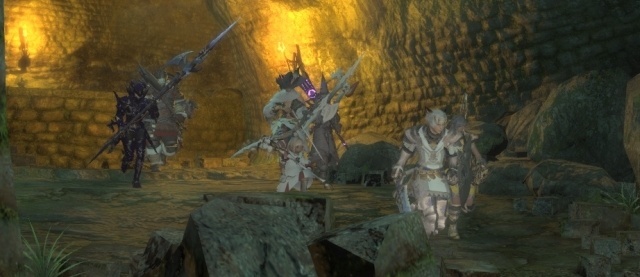Enjoy the Guild Guide column? Keep up to date with our new Twitter account @GuildGuide!
We were all new at the game at one point. As fun as it might be to pretend that you came out of the womb with an instinctive ability to play World of Warcraft at the highest level, the fact of the matter is that every single one of us got our start without knowing the difference between healers, tanks, and whatever the third one is. DPS? I might just want some dip.
The point is that we learn as we go, and for many of us, that’s what our community groups are for. Being part of a group of like-minded players makes every game feel more welcoming. But as you welcome a new player you become aware of a challenging dichotomy. On the one hand, you want to make sure that the new player knows how to play and can do everything necessary to have maximum fun. On the other hand, you don’t want to be anyone’s nanny. So how do you make the best of these new players and turn them into productive members of the larger game society?
Only, you know, without ever uttering that phrase in public.

Always answer questions
One of the most intimidating parts of starting a new game is not understanding how all of its moving parts fit together. You can hardly be blamed for that, of course – you’ve never played the game, you’re going to be stumbling in the dark a bit. But at the same time, you don’t want to look stupid.
It is for this reason that I think it’s very important when a new player asks questions to answer them largely devoid of snark. I say this as someone who loves giving teasing half-answers to questions, not out of disrespect but out of a simple love of teasing half-answers. It’s fun to work in a joke when you’re answering a question, especially if it’s a question that seems kind of obvious… but a new player isn’t asking out of laziness or with an eye toward being silly. They’re asking because they genuinely do not know the answer, and most likely do not know where to look to find the answer.
You don’t want to be someone’s information repository forever, so do make a point of suggesting wikis and guides that can be useful for the new player. But you want to temper that also with calm, reasoned, and reliable answers. Don’t be afraid to say that you don’t know the answer; it’s much more productive to admit that you don’t know something and point to a possible source of information than to pretend you know when you’re shooting in the dark.

Offer moderate help
The tricky part about giving other players help is that it always – always – is a balancing act. I’m not talking about other players who have been there for an eternity and know the game inside and out; I’m talking about players who, honestly, need help being run through every piece of group content the game has to offer in MMOs or need a more experienced teammate in every single League of Legends match.
If you never offer help, then the new player is going to feel like they’re neither wanted nor welcome. If you always offer help, though, you’re going to leave a new player feeling as if they’re carried through everything… meaning that they either never learn the skills necessary to play on their own (bad) or they clock out because all they’ve been offered is the experience of being a pet as other people do all the work (also bad).
Of course, we’re probably not dealing with a situation where the new player is related to you in anyway, so it would be wholly inappropriate for you to tell someone new that it’s time for them to focus on getting out of the guild and playing with others. (If the new player is one of your parents, though, do it; it’d be hilarious.) Instead, you have to take a moderate hand wherein you make it clear that you’re available to help… some of the time.
Is the new player having a rough time getting a group together for something? You’ll be there. Are they trying to figure out how to play a new champion and want someone with experience to back them up – or a familiar face to duel with? Show up. But if they’re just trying to do something that has no benefit to you whatsoever and they can do it on their own, don’t offer your help.
The same goes for resources in online games. The player who has played longer is no doubt full of stuff that a new player doesn’t have. My general policy in Final Fantasy XIV, for example, is that anything below level 30 is so easy to make that I don’t expect anything to help out a friend. Above that, though, and I expect you to provide the materials. It costs more for me to help you past a certain point.

Request nothing beyond presence
I have, on occasion, recruited people to play games with me because I had a spot that needed to be filled. We needed a healer, for example, so I recruited someone to play a healer. This actually worked out all right in most cases, but it was a complete failure all of the time in at least one aspect: absolutely none of the people recruited to fill a role actually filled that role.
Really, this is to be expected – if you’ve never played a game before, it’s hard to know in advance what sort of thing you’ll like doing. But it also speaks to an important element of dealing with new players. If you’ve got a new member of your World of Warcraft guild who happens to be playing a Druid, the right time to encourage them to level up because you need another guild healer is approximately never.
I’m not saying you shouldn’t be happy to have the new person around. When a friend of mine starts playing a game that I’m already entrenched in, I am thrilled. It’s fun to share something I like with someone I already like having around, and it means I can help them bypass some of the more tedious parts. But I don’t encourage them to level up something that would be helpful to me or the like. At most, I’ll suggest what they might wish to do based on their interests.
The reason for this is obvious – when you’re already trying hard to play a new game and get used to different ways of doing things, the last thing you need is extra pressure on you. You don’t want to feel like your friends are helping you chiefly out of a sense of obligation, and you really don’t want to feel like being inadequate at whatever aspect of the game you’re “meant” to perform will result in you being shunned and forgotten. In short, it’s a great way to add a whole mess of strain and frustration for a new player without actually motivating them to do anything they wouldn’t have been inclined to do with or without your pressure. So don’t ask it.
They’ll grow up so fast
Don’t expect the new player to become what you want from them; just do your level best to give them the tools necessary to do well at what they find fascinating. Maybe in time they’ll fill the role that you are really hoping they’ll fill, but maybe they never shall. And that’s all right, and that’s good, and that’s natural.
If you want this person around, you presumably care more about their presence than whether or not they heal you through your latest expedition. Let them feel valued for the things they’re already good at – personality and demeanor – rather than skills they’re still working to develop.







Published: May 8, 2015 08:17 am